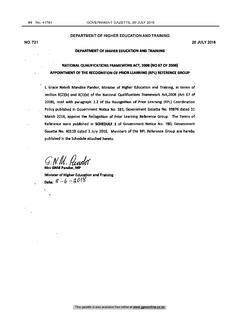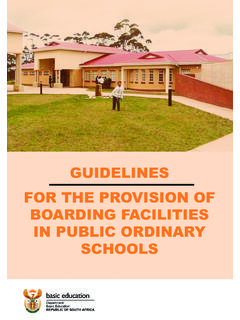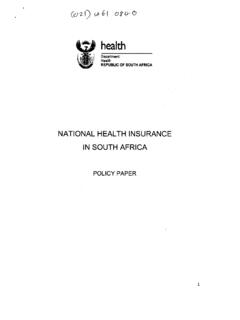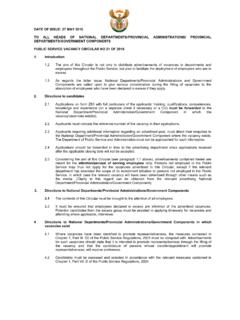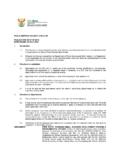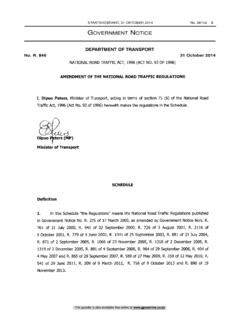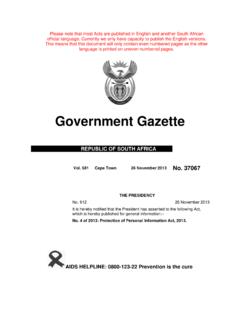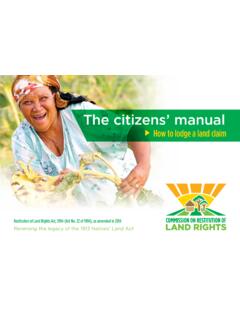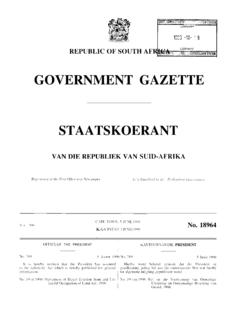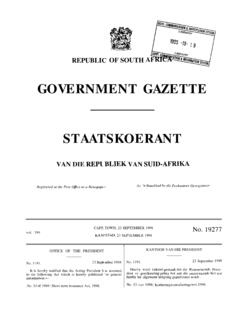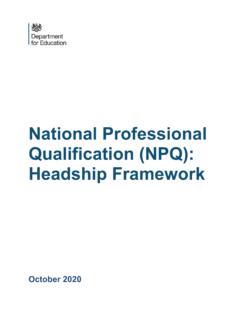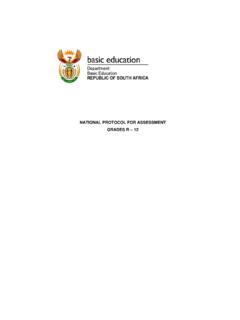Transcription of National Implementation Framework towards the ...
1 STAATSKOERANT, 24 DESEMBER 2020 No. 44031 37. National School of Government/ Nasionale Skool van die Regering National SCHOOL OF GOVERNMENT. NO. 1392 24 DECEMBER 2020. 1392 A National Implementation Framework towards the Professionalisation of the Public Service: Invitation to comment on a National Implementation Framework towards the Professionalisation of the Public Service 26 Feb 2021 44031. A National Implementation Framework towards the Professionalisation of the Public Service 8 December 2020. This gazette is also available free online at 1. 38 No. 44031 GOVERNMENT GAZETTE, 24 DECEMBER 2020. EXECUTIVE SUMMARY. Globally, public services are seized with the issues of professionalism and the professionalisation of their employees and operations. South Africa is no exception, with various initiatives undertaken to ensure that the Public Service is pertinent for democracy and the envisaged developmental state.
2 The draft National Implementation Framework combines various sources as well as views shaping the discourse on professionalisation in public administration and governance. Chapter 10 of the Constitution of the Republic of South Africa (1996) (hereafter, referred to as the Constitution) states that one of the basic values and principles governing public administration requires that a high standard of professional ethics must be promoted and maintained. These values and principles are applicable to administration in every sphere of government; organs of state; and public enterprises. Section 239 of the Constitution defines an organ of state as any department of state or administration in the National , provincial or local sphere of government; or any other functionary or institution exercising a power or performing a function in terms of the Constitution or a provincial constitution; or exercising a public power or performing a public function in terms of any legislation but does not include a court or judicial officer.
3 The Framework document uses the terms public service , public sector and public administration interchangeably and has to be understood in the context of the Constitution in defining public administration and organs of state. Section 197 of the Constitution stipulates that public service is within public administration, which is a broad body with multiple institutional arrangements, consisting of the Public Service and other related institutions. By implication then, a public servant is defined broadly as someone who works in public administration. This Framework document will use the term public servant' to refer to employees in any institution within public administration. Moreover, such employees will inevitably have varied conditions of service, responsibilities, levels of accountability and different tenure arrangements.
4 The Framework document draws an important distinction between being professional and professionalism (which are the practices, conduct, values and behaviour regardless of training, qualifications and levels of responsibility) with the concept of professionalisation (which is about changing individual attitudes, behaviour and performance towards serving the public). It is a values aspect which is about observing and serving people with empathy in accordance with the Constitution, Batho Pele and the Public Service Charter. Professionalising also means having qualified people who know what they are doing and are fully equipped to perform their jobs with diligence. This entails continuous development, which makes public servants more competitive by sharpening their know-how . Importantly, this also requires the professionalisation of certain categories of occupations in the public service, over and above what is already recognised through statutory professional bodies.
5 In the same way that health workers are recognised as a sector and belong to professional bodies which regulates their trade, the state needs to expand this to cover other public service occupations. In furtherance of this initiative, pre-entry exams and compulsory integrity tests must be introduced across levels and sectors. 2. This gazette is also available free online at STAATSKOERANT, 24 DESEMBER 2020 No. 44031 39. Professionalising the Public Service requires a non-partisan approach. For this to be realised, the Public Service must be depoliticised and government departments must be insulated from the politics or political parties. The bureaucracy must continue to loyally and diligently implement the political mandate set by voters and the party, but to refrain from being political actors themselves.
6 To achieve this distinction would require a few decisive reforms, including extending the tenure of Heads of Department (HoD), creating the post of Head of the Public Service, implementing occupation specific competency assessments (not just the generic competency assessments currently in use), ensuring rotation of HoDs every 7 years (while at the same time, implementing the revolving door policy and making secondment policy more flexible) and involving the Public Service Commission (PSC) or their nominated experts in the interviews of Deputy Directors-General (DDGs) and Directors-General (DGs). 3. This gazette is also available free online at 40 No. 44031 GOVERNMENT GAZETTE, 24 DECEMBER 2020. TABLE OF CONTENTS. No. Content Page No. 1. SECTION 1: INTRODUCTION 5. 2. SECTION 2: THE NEED FOR PROFESSIONALISING THE 10.
7 SOUTH AFRICAN PUBLIC SERVICE. 3. SECTION 3: UNDERSTANDING PROFESSIONALISATION -THE 18. CONSTITUTIONAL AND LEGISLATIVE CONTEXT. 4. SECTION 4: PROGRESS TO DATE AND BENCHMARKED 29. STUDIES. 5. SECTION 5: PROPOSALS FOR PROFESSIONALISING THE 46. PUBLIC SERVICE. 6. SOURCE REFERENCES 58. 4. This gazette is also available free online at STAATSKOERANT, 24 DESEMBER 2020 No. 44031 41. SECTION 1: INTRODUCTION. 5. This gazette is also available free online at 42 No. 44031 GOVERNMENT GAZETTE, 24 DECEMBER 2020. 1. PURPOSE AND OBJECTIVES OF THE National Implementation . Framework . The purpose of this document is to develop a National Implementation Framework towards the professionalisation of the Public Service. Under the leadership of the Minister for the Public Service and Administration (MPSA) and mandated through the Governance, State Capacity and Institutional Development (GSCID) Cluster, the Department of Public Service and Administration (DPSA) and the National School of Government (NSG) have been instrumental in conceptualising this document and undertaking consultations thus far.
8 Finally, the Framework was also tabled at the Cabinet meeting held on 18 November 2020, and the decision of Cabinet was as follows: Cabinet approved publication of the draft National Implementation Framework towards the professionalisation of the Public Service. This is in line with the commitment made by the sixth administration to create a capable, ethical and developmental Public Service. The Framework proposes five critical professionalisation pillars which will be led by the National School of Government (NSG), in partnership with various institutions of learning. The five pillars include pre-entry recruitment and selection within the public service;. induction and onboarding; planning and performance management; continuous learning and professional development, and career progression and career incidents.
9 The objectives of the Framework are as follows: a. Entrenching a dynamic system of professionalisation in the Public Service. b. Strengthening and enabling the legal and policy instruments to professionalise categories of occupations in the Public Service. c. Enhancing and building partnerships and relationships with professional bodies. d. Ensuring meritocracy in the recruitment and career management of public servants, which are in line with National Development Plan and the Medium Term Strategic Framework . e. Initiating consequence management for material irregularities through the transgression mechanisms available to professional bodies and the Public Audit Amendment Act of (Act 5 of 2018). While public servants who belong to professions such ads teaching, nursing, auditing, engineering, law, medicine etc.
10 Have the dual benefit, or burden, of navigating their way through detailed codes of conducts that are externally managed, the majority of public servants whose occupations are not regulated by any independent professional association place reliance on the existing generic Framework used by the Public Service. This is notwithstanding the lack of clarity and mechanisms on how the Public Service is leveraging the benefits of external professional membership to enhance the professionalism of its employees, where applicable. The existence of externally managed/moderated professions as well as non-professionalised' professions within the Public Service, if not systematically addressed, has the potential to derail debates and processes to professionalise the Public Service. 6. This gazette is also available free online at STAATSKOERANT, 24 DESEMBER 2020 No.
